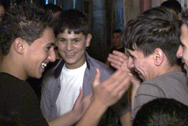By Aurora Tellenbach
There are thousands of Palestinian children who have served time in Israeli prisons. When the boys return home they are greeted and celebrated; for some, this is the happiest day of their life. Among them is 15 year old Mohammad Jamil who was incarcerated in an Israeli prison for four months. Together with other former child inmates from Hebron he shares his traumatic experiences with the counsellor Nader Khallaf. The boys discuss how life has changed for them and the difficulties they face in readjusting to ‘normal’ life under Israeli occupation.
 The returning boys choose to drop out of school rather than continue their education with younger classmates. With few other prospects, the boys resort to throwing stones at Israeli soldiers who are just waiting for the opportunity to re-arrest them. This pattern is repeated with every generation.
The returning boys choose to drop out of school rather than continue their education with younger classmates. With few other prospects, the boys resort to throwing stones at Israeli soldiers who are just waiting for the opportunity to re-arrest them. This pattern is repeated with every generation.
When the Boys Return documents the experiences of the boys trapped in a life of hopelessness and violence and the manifestation of this in anger against everyone including themselves. Through counselling the boys are given the help they need to deal with their emotions and to imagine a different future.
As Palestinian President Mahmoud Abbas applies for the nation’s full membership at the United Nations, Khallaf asks the boys what they aspire to be. One wants to be a pilot, as every state needs a pilot. Another wants to study law and another nursing. Mohammad likes cars and through Khallaf he is given the opportunity to attend the Polytechnic University.
When The Boys Return will be screening at RichMix on Thursday 16 May 2013 at 8.00pm. Click here for more information.
Aurora Tellenbach is an arts project manager mainly working on stage productions with cross-cultural themes. Formerly a broadcast journalist, Aurora is now in the process of completing a PhD on Mapping Migration in Contemporary Arab Cinema (2000-2010). She has lectured on the same subject to postgraduate Film Studies students and has conducted extensive fieldwork in North Africa and the Levant.

